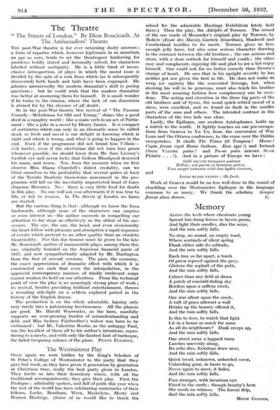The Theatre
" The Streets of London." By Dion Boucicault. At The Ambassadors' Theatre
THE post-War theatre is for ever returning dusty answers : a form of repartee which, however legitimate in so uncertain
an age as ours, tends to set the theatregoer hankering for problems boldly stated and heroically solved, for characters labelled without ambiguity. He is a little tired of incon- clusive introspection, of plays in which the moral issue is decided by the spin of a coin from which (as is subsequently discovered) both heads and tails have been expunged. He admires unreservedly the modern dramatist's skill in posing questions ; but he could wish that the modern dramatist was better at answering them for himself. It is small wonder if he turns to the cinema, where the lack of one dimension is atoned for by the absence of all doubt. - So in the post-War theatre this revival of " The Famous Comedy—Melodrama for Old and Young," shines like a good deed in a naughty world : like a main verb in an act of Parlia- ment : like a joke in a novel by Henry James. It is compact of certainties which can only in an idiomatic sense be called dead, so fresh and novel is our delight in knowing which is
right and which is wrong, and what is going to happen in the end. Even if the programme did not brand him Villain— rich banker, even if the electrician did not turn him green
whenever possible, we should know from Mr. Sam Livesey's basilisk eye and raven locks that Gideon Bloodgood deserved his name, and worse. Nor, from the moment when we first observe Miss Diana Churchill's dulcet credulity, can we blind ourselves to the probability that several quires at least of the Terrific Realistic Snowstorm announced in the pro- gramme will fall on the inevitably unprotected head of Lucy (Ingenue Heroine). No : there is very little food for doubt
in this play. No one will ask you afterwards if it was true to life, or fair to women. In The Streets of London no hares are started.
But the curious thing is that—although we know the form backwards, although none of the characters can surprise or even interest us—the author succeeds in compelling our attention to his stage as effectively as the ablest of his suc- cessors. The eye, the ear, the head, and even occasionally the heart follow with pleasure and absorption a rapid sequence of events which pretend to no other quality than an obsolete theatricality. For this due honour must be given to the late Mr. Boucicault, author of innumerable plays, among them this one, originally founded on the American financial panic of 1857, and now sympathetically adapted by Mr. Darlington from the first of several versions. The pace, the economy, the exact appreciation of dramatic effect with which it is constructed are such that even the interpolation, in the approved contemporary manner, of wholly irrelevant songs cannot weaken its hold on our attention. From the technical point of view the play is an amazingly strong piece of work ; its revival, besides providing brilliant entertainment, throws a revealing side-light on a seldom explored period in the history of the English drama.
The production is on the whole admirable, lapsing only very rarely into a patronizing facetiousness. All the players
are good. Mr. Harold Warrender, as the hero, manfully supports an ever-growing burden of misunderstanding and debt, and Miss Sydney Fairbrother's widow was born to be victimized ; but Mr. Valentine Rooke, as the unhappy Paul, was the loyallest of them all to his author's intentions, repro-. ducing to a nicety, and with only the faintest hint of burlesque; the faded twopenny colours of the piece. PETER FLEMING.






























 Previous page
Previous page